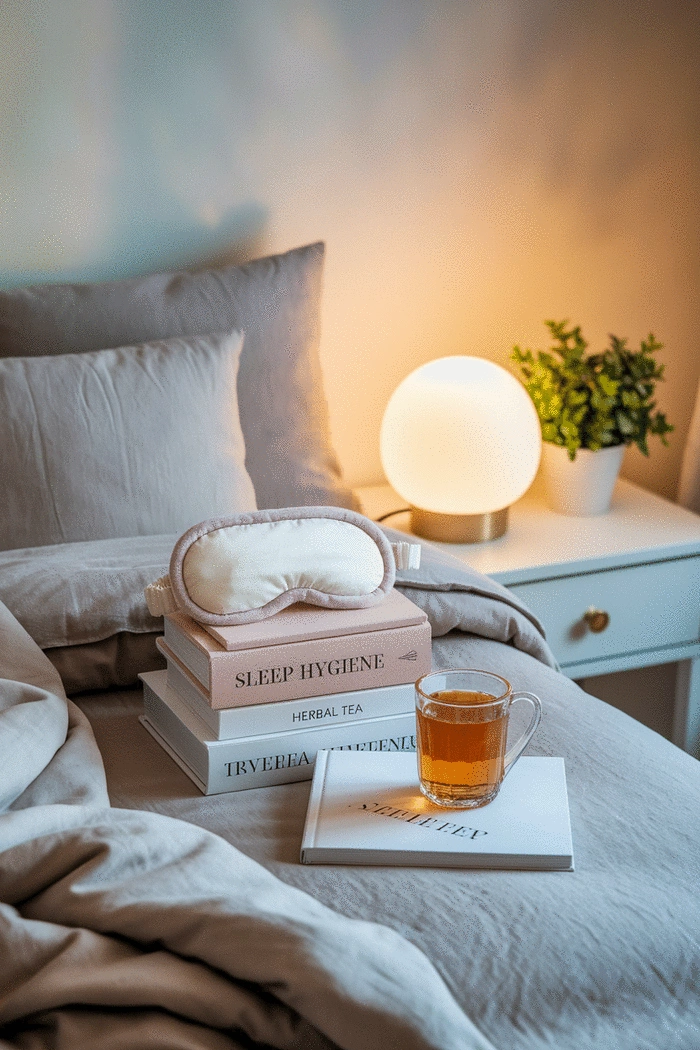Sleep Hygiene Tips for Seniors

Posted on: 2025-10-25
By: Elena Hartwell
As we age, the quality of our sleep can greatly impact our health and well-being. Understanding the concept of sleep hygiene is crucial for older adults seeking to enhance their restfulness and vitality. Here’s a collection of essential insights that can help you achieve better sleep.
What You Will Learn
- The definition of sleep hygiene and its significance for older adults, emphasizing habits that promote better sleep.
- The critical connection between quality sleep and overall health, highlighting risks such as chronic conditions and cognitive decline.
- Practical tips for establishing a consistent sleep schedule, including maintaining regular bedtimes and avoiding long naps.
- Strategies for creating a comfortable sleep environment, focusing on elements like temperature, noise, and darkness.
- The importance of relaxation techniques, such as meditation and light stretching, to prepare the body for sleep.
- Advice on managing dietary habits, particularly the reduction of caffeine and alcohol intake before bedtime.
- The benefits of keeping a sleep diary to track patterns and identify factors that influence sleep quality.
- Encouragement to seek professional help for persistent sleep issues, emphasizing the importance of consulting with healthcare providers.
Key Components of Sleep Hygiene and Their Benefits for Older Adults
Understanding the core elements that contribute to better sleep quality can significantly improve the daily lives of older adults. Below is a visual representation of essential sleep hygiene practices and their associated benefits.
Consistent Sleep Schedule
Regular patterns regulate the body’s clock.
Benefits:
- Improved sleep quality
- Better mood
- Enhanced cognitive function
Comfortable Sleep Environment
Optimal conditions for restful sleep.
Benefits:
- Reduced disruptions
- Better relaxation
- Enhanced comfort
Dietary Habits
Managing intake helps avoid sleep disturbances.
Benefits:
- Reduced insomnia
- Stable energy levels
- Improved overall health
Understanding the Importance of Sleep Hygiene in Older Adults
As we age, the way we sleep can significantly change, impacting our health and well-being. That’s why understanding sleep hygiene is essential for older adults. It’s not just about counting sheep; it’s about creating a comfortable and calming sleep environment, maintaining routines, and making conscious choices that enhance sleep quality.
Sleep hygiene encompasses practices that help improve both the quality and duration of sleep. For older adults, this means paying attention to factors like bedtime routines, the sleep environment, and lifestyle choices that can disrupt restful slumber. By prioritizing these elements, we can foster healthier sleep habits and enjoy more fulfilling days!
Defining Sleep Hygiene: What It Means for Older Adults
To put it simply, sleep hygiene refers to habits and practices that promote better sleep. Think of it as a toolkit—one that includes everything from setting a bedtime to creating a peaceful sleep environment. It’s essential for older adults to grasp these concepts because, as we age, our bodies may require different approaches to achieve restful sleep.
Here are some core components of sleep hygiene for older adults:
- Maintaining a consistent sleep schedule
- Creating a comfortable sleep environment
- Limiting caffeine and alcohol consumption
- Engaging in relaxation activities before bed
The Connection Between Sleep Quality and Health in Older Adults
Sleep is not just a time for our bodies to rest; it’s a critical period for healing and rejuvenation. Quality sleep is tied to numerous health benefits, including improved mood, cognitive function, and even physical health. It’s fascinating how sleep can serve as a barometer for our overall well-being!
Research suggests that inadequate sleep can lead to several health issues, especially in older adults, such as:
- Increased risk of chronic conditions (like diabetes and heart disease)
- Worsening of mental health issues (such as anxiety and depression)
- Decreased cognitive function and memory problems
At Vital Aging Hub, we believe it’s crucial to address sleep hygiene as part of a holistic approach to aging. By prioritizing our sleep, we can embrace the journey of growing older with grace and vitality!
Establishing a Consistent Sleep Schedule for Better Rest
One of the simplest yet most effective ways to enhance sleep quality is by establishing a consistent sleep schedule. Regular sleep patterns help regulate our body’s internal clock, making it easier to fall asleep and wake up feeling refreshed. It’s like training your body to recognize when it’s time to rest!
Here are some benefits of maintaining a regular sleep routine for seniors:
- Improved overall sleep quality
- Better mood regulation
- Enhanced cognitive function
- Increased energy levels during the day
Tips for Creating a Sustainable Sleep Schedule
Creating a sleep schedule doesn’t have to be overwhelming. Here are some tips to help you establish a sustainable routine:
- Go to bed and wake up at the same time every day, even on weekends.
- Avoid naps longer than 30 minutes during the day.
- Limit screen time at least an hour before bed.
- Incorporate relaxing bedtime rituals, like reading or gentle stretching.
The Role of Circadian Rhythm in Sleep Scheduling
Your circadian rhythm plays a significant role in how well you sleep. This internal clock regulates the sleep-wake cycle, responding to environmental cues like light and temperature. Understanding and honoring your circadian rhythm can lead to better sleep quality!
Here are some ways to respect your body's natural rhythm:
- Expose yourself to natural light during the day.
- Dim the lights in the evening to signal your body that it’s time to wind down.
- Keep your bedroom consistently dark at night.
By aligning your sleep habits with your circadian rhythm, you’re setting yourself up for a more restful night’s sleep! At Vital Aging Hub, I’m excited to share these insights that empower you to embrace healthier sleep practices.
Pro Tip
Did you know? Establishing a bedtime routine that includes technology-free time can significantly improve your sleep quality. Consider engaging in calming activities like reading a book or practicing deep breathing exercises to prepare your mind and body for rest. Limiting blue light exposure from screens allows your body to produce melatonin more effectively, paving the way for a more restful night!
Recap of Essential Sleep Hygiene Tips for Older Adults
As we wrap up our conversation about sleep hygiene, it's crucial to remember the key strategies that can significantly enhance sleep quality for older adults. The journey to better sleep begins with understanding and implementing a few simple practices that can make a world of difference. Here’s a quick recap of some important tips to consider:
- Establish a consistent sleep schedule by going to bed and waking up at the same time every day.
- Create a comfortable sleep environment with the right temperature, minimal noise, and darkness.
- Incorporate relaxation techniques, such as meditation or gentle stretches, before bedtime.
- Manage dietary habits by avoiding caffeine, alcohol, and heavy meals close to bedtime.
- Stay socially connected, as building relationships can support better sleep patterns.
By following these strategies, older adults can cultivate an environment that promotes restful sleep, allowing for rejuvenation and overall well-being. Remember, at Vital Aging Hub, we're here to support you every step of the way in your quest for vitality and better sleep!
Summarizing Key Strategies for Better Sleep Quality
Each individual's journey to better sleep is unique, and it's essential to recognize that there isn’t a one-size-fits-all solution. Here are some personalized strategies for improving sleep quality:
- Personalize your sleep routine by experimenting with different relaxation techniques to see what works best for you.
- Consider factors like your health conditions or medications that might affect your sleep.
- Utilize sleep diaries to record patterns and identify what positively or negatively influences your rest.
By tailoring your approach to sleep hygiene, you can find what resonates most with your personal lifestyle, enhancing your quality of life as you age. Always remember, your well-being is at the heart of what we do at Vital Aging Hub!
Encouraging Proactive Steps Towards Improved Sleep
Now that we've explored the essential components of sleep hygiene, it's time to encourage proactive steps towards better sleep. Making small yet impactful changes can lead to significant improvements in how you feel each day. Let's dive into some actionable tips you can start implementing right away!
Actionable Tips for Immediate Implementation
Here are a few straightforward actions you can take today to foster better sleep:
- Set a bedtime alarm to remind you when to start winding down.
- Unplug from electronic devices at least one hour before sleep.
- Create a calming pre-sleep ritual that helps signal your body it's time to rest.
- Incorporate light stretching or relaxation exercises into your evening routine.
These small steps can lead to greater consistency in your sleep habits, making a noticeable difference in how you feel! Each night is an opportunity to improve your rest, contributing to a healthier, more vibrant life.
The Value of Sleep Diaries for Tracking Sleep Patterns
One effective way to understand your sleep habits better is by keeping a sleep diary. This tool can provide insight into your sleep patterns and help you identify areas for improvement. Consider tracking the following:
- Bedtime and wake-up time
- How long it takes to fall asleep
- Number of awakenings during the night
- Feelings upon waking—refreshed or still tired?
This information can be incredibly valuable when discussing sleep concerns with healthcare providers. At Vital Aging Hub, we believe that a proactive approach to your health can lead to remarkable results!
Consulting Healthcare Providers for Persistent Sleep Challenges
If you're facing persistent sleep challenges, it's essential to consult with a healthcare provider. They can help identify any underlying issues and suggest individualized treatments, whether they involve lifestyle changes, therapy, or medication. Don't hesitate to seek professional guidance—your sleep health is worth it!
As we continue this journey together at Vital Aging Hub, remember that improving your sleep is a vital step towards nurturing your overall health and vitality. Together, we can create a brighter, more rested future!
Recap of Key Points
Here is a quick recap of the important points discussed in the article:
- Establish a consistent sleep schedule to regulate your body's internal clock.
- Create a comfortable sleep environment that promotes relaxation and minimizes disturbances.
- Incorporate relaxation techniques, such as meditation or light stretching, before bedtime.
- Manage dietary habits by avoiding caffeine, alcohol, and heavy meals close to bedtime.
- Stay socially connected, as building relationships can enhance sleep patterns.
- Utilize sleep diaries to track patterns and understand what influences your rest.
- Consult healthcare providers if persistent sleep challenges arise for tailored guidance.
FAQs
- What is sleep hygiene? Sleep hygiene refers to habits and practices that promote better sleep, including setting a bedtime and creating a peaceful sleep environment.
- Why is sleep hygiene important for older adults? Quality sleep is vital for health, impacting mood, cognitive function, and physical well-being. As we age, sleep needs may change, making good sleep hygiene essential.
- How can I establish a consistent sleep schedule? Go to bed and wake up at the same time every day, limit daytime naps, and create relaxing bedtime rituals.
- What should I include in my sleep environment? Your sleep environment should be comfortable, dark, quiet, and at a suitable temperature for restful sleep.
- How can relaxation techniques help with sleep? Techniques like meditation and light stretching can help calm the body and mind, making it easier to fall asleep.
- Should I consult a healthcare provider for sleep issues? Yes, if you experience persistent sleep challenges, consulting a healthcare provider can help identify underlying issues and suggest treatments.
 What if the secret to feeling happier in your golden years lies in giving back? Research shows that
What if the secret to feeling happier in your golden years lies in giving back? Research shows that
 Have you ever considered how financial wellness can shape your retirement experience? The pathway to
Have you ever considered how financial wellness can shape your retirement experience? The pathway to
 What if a simple habit could enhance your cognitive function and overall vitality as you age? Hydrat
What if a simple habit could enhance your cognitive function and overall vitality as you age? Hydrat
